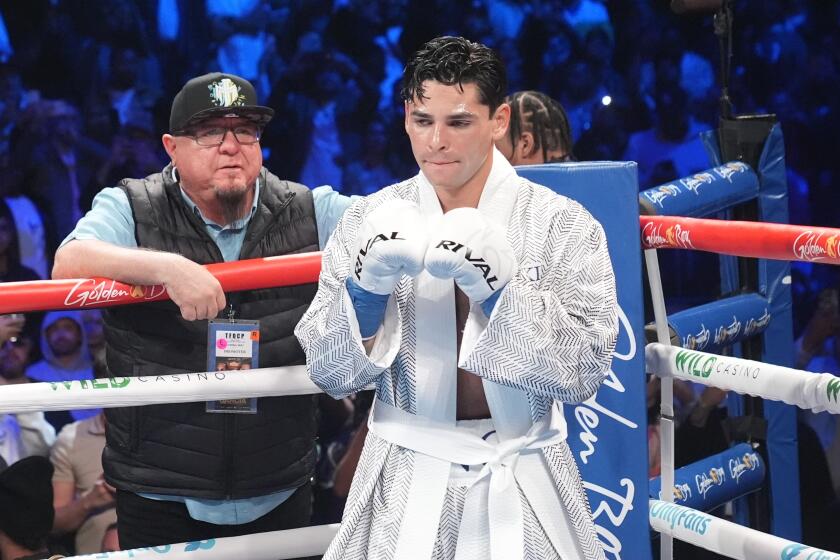Don King Takes Some Punches
He thrives as a sports mogul and media manipulator.
See him any time globbing on the glitz, schmoozing with Henry Kissinger, bear hugging Michael Jackson, standing beside Joan Rivers, chatting with Donald Trump, laughing with George Bush, quipping in reruns of “Hollywood Squares.”
Performing before the camera.
When this maestro conducts, the media fiddle his tune.
As someone able to command television at will, boxing mega-promoter Don King ranks right up there with Madonna, Arnold Schwarzenegger and the President. Any President.
He gets what he wants from TV--publicity--by supplying what it wants: a show.
Just like Zsa Zsa, he’s cute, funny and outrageous. Oh, so outrageous. Just look at the picture: King flashing white teeth while playfully lecturing the press nonstop before one of his fights, his famous Brillo hair brushed forward so that it adds eight inches to his height.
How the TV people adore him, exactly as they adored that wild-man monologuist Muhammad Ali in his self-promotional heyday. Even when they know King is using them, they still adore him for putting on such a glorious performance. Seeing themselves as extensions of the beat they cover, most guffaw at his antics, wink at his past and never ask him about the methods he is said to have used in gaining virtual control of boxing’s heavyweight division while becoming bigger even than the sport itself.
Who is hiding behind that clown’s mask?
“If Don King were a city, he would be Las Vegas--flamboyant, awake 24 hours a day, driven by money, rooted in gambling and the mob.”
So says veteran investigative reporter Jack Newfield in “Don King, Unauthorized,” Tuesday’s savage-punching “Frontline” documentary that recounts King’s dark, violent past--he had a long arrest record in Cleveland and served four years for manslaughter, for which he was later pardoned--and examines his murky present.
King, whom Newfield says refused to be interviewed for this program, has accused “Frontline” of “vicious character assassination.”
The hourlong program, which airs Tuesday at 8 p.m. on KVCR Channel 24 and at 9 p.m. on KCET Channel 28 and KPBS Channel 15, does indeed assassinate King’s shrewdly crafted public persona as a windy but harmlessly hammy super salesman. It also indicts boxing itself and, by implication, the media for their roles in helping King and his empire flourish.
“Frontline” had wanted “Don King, Unauthorized” to air in proximity of the Mike Tyson-Evander Holyfield heavyweight championship fight. But the bout has been postponed indefinitely.
That such a critical documentary is appearing on PBS is noteworthy in that it, unlike ABC, CBS, NBC, HBO, USA, TBS and ESPN, for example, has no major sports contracts. And thus unlike them, no financial risk or toes to avoid stepping on.
Newfield on occasion draws damning conclusions based on unproved allegations or paints King with a brush that’s too broad, at one point seeming even to blame Tyson’s recent woes solely on his close association with King.
Otherwise, however, Newfield and producer Charles Stuart at least partially substantiate their charges that King is a liar and a cheat who maintains ties to organized crime going back three decades to when he was “the biggest numbers boss in Cleveland.”
In some ways, King’s story says as much about TV as boxing. He may not have planned it that way, but to command the attention of sportscasters among others, he first had to acquire the look.
A friend, soul singer Lloyd Price, recalls a discussion they had years ago about how King should acquire a “unique look,” starting with wearing flashy tuxedos. Then King began experimenting with hairstyles, Price says. “Don started combing his hair forward. And before you knew it he had that look, and everybody started calling him ‘Electric Lights.’ ”
Along with the look came the act .
“Don’s hair, his jewelry, his lingo, his jargon--is all an act,” says Seth Abraham, president of Time Warner Sports, who has negotiated many HBO deals with King. “It’s to confuse, it’s to obscure, it’s to de-arm people.”
Abraham says he never saw King do anything illegal, only capitalize on boxing’s gray areas and “disstructure.”
But Ali’s friend, Jeremiah Shabaz, claims here that King drastically underpaid Ali after the brutal beating he took in his last championship fight. “When he uses you up, then he has no more need for you,” Shabaz says.
Some of the stories illustrating that are merely amusing. Ever the opportunist, King attended a 1973 heavyweight title fight in Jamaica, riding to the stadium in the limo of champ Joe Frazier and sitting in his corner. After Frazier was knocked out, he left in the limo of winner George Foreman. Later, he became Foreman’s promoter.
More serious is the case of former heavyweight champ Tim Witherspoon. Calling him “an evil man,” Witherspoon claims that King continually “robbed” him, but never more so than after his successful title defense against Frank Bruno, a fight that generated millions in revenue.
According to Newfield, $900,000 went to challenger Bruno and $250,000 to King’s stepson, Carl, whom the older King had installed as Witherspoon’s manager. Witherspoon, the champion, netted only $90,000.
In addition, Newfield says, Don King later put himself in a “no-lose situation” on the eve of Witherspoon’s unsuccessful title defense against James (Bonecrusher) Smith by naming Carl to also manage Smith. Thus when the two fighters met in the ring, Newfield adds, both were being managed by Carl, “a conflict of interest unusual even by boxing standards.”
Witherspoon says he received threats and at one point even armed himself “for protection” after filing a $25-million suit against both Kings, alleging “fraud and conflict of interest.”
“How could Don intimidate you?” Newfield asks.
“He has a lot of money,” Witherspoon replies. “Money is power. And I’m sure everybody knows what can come after that.”
A hint comes near the end of the hour when King, reacting to a question Newfield puts to him at a press conference prior to a Tyson fight, simply explodes, launching a frightening tirade against Newfield.
Finally, Don King meets “Candid Camera.”
More to Read
Go beyond the scoreboard
Get the latest on L.A.'s teams in the daily Sports Report newsletter.
You may occasionally receive promotional content from the Los Angeles Times.









